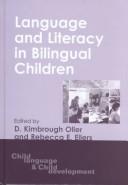| Listing 1 - 5 of 5 |
Sort by
|


ISBN: 1280828013 9786610828012 9781853595729 1853595721 9781853595721 1853595713 9781853595714 1853595705 9781853595707 6610828016 9781280828010 Year: 2002 Volume: 2 Publisher: Bristol Blue Ridge Summit
Abstract | Keywords | Export | Availability | Bookmark
 Loading...
Loading...Choose an application
- Reference Manager
- EndNote
- RefWorks (Direct export to RefWorks)
This book sets a high standard for rigor and scientific approach to the study of bilingualism and provides new insights regarding the critical issues of theory and practice, including the interdependence of linguistic knowledge in bilinguals, the role of socioeconomic status, the effect of different language usage patterns in the home, and the role of schooling by single-language immersion as opposed to systematic training in both home and target languages. The rich landscape of outcomes reported in the volume will provide a frame for interpretation and understanding of effects of bilingualism for years to come.
Bilingualism in children. --- Children --- Language development in children --- Interpersonal communication in children --- Language and languages --- Language. --- Vocabulary --- Bilingualism in children --- Language --- Children - Language --- Bilingual children. --- Bilingual education. --- Bilingualism. --- Biliteracy. --- Cultural assimilation. --- English. --- Monolingualism. --- Morphosyntactics. --- Multilingualism. --- Narrative competence. --- Spanish. --- Standardized tests.
Book

ISBN: 1433822849 1433822830 9781433822841 9783110395341 3110395347 9783110341249 3110341247 9781433822834 9783110340440 3110340445 3110610469 Year: 2016 Publisher: Berlin Boston
Abstract | Keywords | Export | Availability | Bookmark
 Loading...
Loading...Choose an application
- Reference Manager
- EndNote
- RefWorks (Direct export to RefWorks)
This book pioneers the study of bilingualism across the lifespan and in all its diverse forms. In framing the newest research within a lifespan perspective, the editors highlight the importance of considering an individual's age in researching how bilingualism affects language acquisition and cognitive development. A key theme is the variability among bilinguals, which may be due to a host of individual and sociocultural factors, including the degree to which bilingualism is valued within a particular context.Thus, this book is a call for language researchers, psychologists, and educators to pursue a better understanding of bilingualism in our increasingly global society.
Language acquisition --- Second language acquisition. --- Bilingualism. --- Cognitive learning. --- Psycholinguistics. --- Language, Psychology of --- Language and languages --- Psychology of language --- Speech --- Linguistics --- Psychology --- Thought and thinking --- Learning --- Languages in contact --- Multilingualism --- Second language learning --- Age factors in language acquisition --- Ability, Influence of age on --- Age factors. --- Psychological aspects --- Second language acquisition --- Bilingualism --- Cognitive learning --- Psycholinguistics --- Acquisition du langage. --- Langue maternelle et langue seconde (enseignement des langues) --- Bilinguisme. --- Apprentissage cognitif. --- Psycholinguistique. --- Age factors --- Interpersonal communication in children
Book

ISBN: 178309172X 1783091711 9781783091713 130673939X 9781306739399 9781783091706 1783091703 Year: 2014 Publisher: Bristol Blue Ridge Summit
Abstract | Keywords | Export | Availability | Bookmark
 Loading...
Loading...Choose an application
- Reference Manager
- EndNote
- RefWorks (Direct export to RefWorks)
This book provides a contemporary approach to the study of bilingualism. Drawing on contributions from leading experts in the field, this book brings together - in a single volume - a selection of the exciting work conducted as part of the programme of the ESRC Centre for Research on Bilingualism in Theory and Practice at Bangor University, Wales. Each chapter has as its main focus an exploration of the relationship between the two languages of a bilingual. Section by section, the authors draw on current findings and methodologies to explore the ways in which their research can address this question from a number of different perspectives.
Bilingualism --- Code switching (Linguistics) --- Education, Bilingual --- Bilingual education --- Multilingual education --- Language shift --- Switching (Linguistics) --- Linguistics --- Diglossia (Linguistics) --- Language and languages --- Languages in contact --- Multilingualism --- Bilingualism - Wales - Case studies --- Code switching (Linguistics) - Wales - Case studies --- Education, Bilingual - Wales --- Script switching (Linguistics)
Book

ISBN: 9781783090150 1783090154 1299927068 9781299927063 9781783090143 1783090146 9781783090136 1783090138 9781783090167 1783090162 Year: 2013 Publisher: Bristol Blue Ridge Summit
Abstract | Keywords | Export | Availability | Bookmark
 Loading...
Loading...Choose an application
- Reference Manager
- EndNote
- RefWorks (Direct export to RefWorks)
Solutions for the Assessment of Bilinguals presents innovative solutions for the evaluation of language abilities and proficiency in multilingual speakers – and by extension, the evaluation of their cognitive and academic abilities. This volume brings together researchers working in a variety of bilingual settings to discuss critical matters central to the assessment of bilingual children and adults. The studies include typically developing bilingual children, bilingual children who may be at risk for language impairments, bilingual and multilingual children and adults found in classrooms, and second-language learners in childhood and adulthood. The contributions propose a variety of ways of assessing performance and abilities in the face of the multiple issues that complicate the best interpretation of test performance.
Education, Bilingual --- English language --- Language and languages --- Language arts --- #KVHB: Engels --- #KVHB:Taalontwikkeling --- #KVHB:Taaltest --- #KVHB:Tweetaligheid --- Language assessment --- Germanic languages --- Bilingual education --- Bilingualism --- Multilingual education --- Ability testing --- Study and teaching&delete& --- Foreign speakers --- Study and teaching --- EFL (Language study) --- English as a foreign language --- English as a second language --- English to speakers of other languages --- ESL (Language study) --- ESOL (Language study) --- Teaching English as a second language --- TEFL (Language study) --- TESL (Language study) --- Ability testing. --- Foreign speakers. --- Foreign students
Book

ISBN: 9781783090105 Year: 2013 Publisher: Bristol Blue Ridge Summit
Abstract | Keywords | Export | Availability | Bookmark
 Loading...
Loading...Choose an application
- Reference Manager
- EndNote
- RefWorks (Direct export to RefWorks)
| Listing 1 - 5 of 5 |
Sort by
|

 Search
Search Feedback
Feedback About UniCat
About UniCat  Help
Help News
News